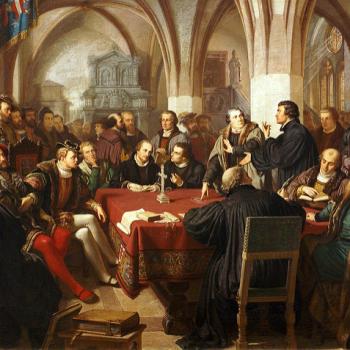
(2-2-07)
The topic was first brought up at The Boar’s Head forum, with reference to the article of the same name by Edward T. Oakes, S.J. (First Things, 31 January 2007). It was then noted by Reformed writer Alastair Roberts, on his adversaria blog, and in turn cited by ReformedCatholicism.com. As I am banned from the latter site because I have protested more than once the rather (somewhat ironically) “un-ecumenical” treatment of Catholics, and especially Catholic converts (and notably, Cardinal Newman) in that venue, I commented at adversaria, since I have enjoyed many amiable dialogues with Alastair. Other commenters on that blog will be listed in various colors:
It’s a good article, though the sentence you quote does betray a typical misperception of the Reformation, common (but not exclusive) to Roman Catholics: “the Reformers took a portion…”
Whenever I read about the Reformers having “left” the Roman Catholic Church, or being schismatic, or whatever, I feel an urge to scream, in words of one syllable: “They! Did! Not! Leave!!! They! Were! THROWN! OUT!!!!!”
By John H on 02.01.07 9:08 am [I link to John’s blog on my sidebar; he’s a Lutheran]
Wouldn’t it be more accurate to say, “When we booted out the Protestants, they did not entirely plunder us of our patrimony”?
By Christopher Witmer on 02.01.07 12:57 pm
If they kick me out, and I didn’t do anything except preach the truth, then who’s the real schismatic?
By Xon on 02.01.07 5:50 pm [Reformed]
“Thrown out”? I suppose in one way this is true, but one must look at the impossible position that they forced the Catholic Church to be in.
I would contend that no one who is conscious and in his right mind would say that any church, confronted with a dissident who denied fifty of its long-held tenets, would tolerate this; nor should they be expected to.
Reformed Protestants (at least the “conservative” ones) don’t even tolerate deviation from TULIP, for heaven’s sake, and that only has to do with soteriology. We Catholics were faced with a frontal attack on many different areas of our faith: things we held sacred: just as you do with regard to your beliefs.
I ask my Protestant friends: what were we supposed to do? Anyone who has any belief system that had been developed for 1500 years is not gonna simply ditch it because one man comes along, in effect (and sometimes almost literally) claiming to be some sort of pseudo-prophet from God.
No self-respecting Protestant denomination today would consider such a radical change in their own system for a second. Yet that is what the Catholic Church in 1521 was expected to do, because, well, “everyone knows” that Luther was right and the 1500-year received tradition wrong.
No, we don’t all “know” that. And I “know” it less and less the more I study the issues involved. I gave a more extended presentation of the above argument in this paper:
I haven’t read the article cited yet; I’m just giving my initial reaction to this very common Protestant piece of highly unreasonable and unjust rhetoric.
Ironically, the reasoning that N. T. Wright uses in a post not far below, with regard to morality, almost exactly applies analogously to Luther’s demands in 1517-1521. If I change just a few key words, you’ll see how this is the case:
N. T. Wright:
There is no way that the Catholic Church is going to change its mind on this one given 18 months or so. This completely fails to take into account the views and beliefs of all those involved. The idea that New Labour – which has got every second thing wrong and is backtracking on extended drinking hours, is in a mess over this cash-for-peerages business, cannot keep all its prisons under control – the idea that New Labour can come up with a new morality which it forces on the Catholic Church after 2,000 years – I am sorry – this is amazing arrogance on the part of the Government.
Legislation for a nouveau morality is deeply unwise. That is not how morality works. At a time when the Government is foundering with so many of its policies – and I haven’t even mentioned Iraq – the thought that this Government has the moral credibility to be able tell the Roman Catholic Church how to order one area of its episcopal teaching is frankly laughable. When you think about it like that, it is quite extraordinary. I suppose the hope is that in 18 months time there will be a different Prime Minister who might take a different view, and this will kick it into the long grass until then.
And my analogy (changing a few words):
There is no way that the Catholic Church is going to change its mind on its theological doctrine given 18 months or so. This completely fails to take into account the views and beliefs of all those involved. The idea that New Sects and one man, Martin Luther . . . can come up with a new theology which it forces on the Catholic Church after 1,500 years – I am sorry – this is amazing arrogance on the part of the New Sects and Martin Luther.
Legislation for a nouveau theology is deeply unwise. That is not how theology works. . . . The thought that this New Sect and one man, Martin Luther, have the moral credibility to be able tell the Roman Catholic Church how to order any areas of its episcopal teaching is frankly laughable. When you think about it like that, it is quite extraordinary. I suppose the hope is that in 18 months time there will be a different [self-proclaimed] “Restorer of the Gospel” who might take a different view, and this will kick it into the long grass until then.
What is the difference of principle between the two? When it comes to government forcing advocacy of homosexuality onto the Catholic Church, you guys all cheer on the Catholics and readily see the invalidity of the principle.
But when we rewind back to 1521, no one sees that the same exact dynamics apply with regard to Luther’s 50 or more departures from Catholic precedent, and how the Church was supposed to react to that.
Someone please tell me what the difference is between the two scenarios? If the Catholic Church should not budge on one moral teaching, why should it simultaneously budge on 50 theological teachings, all at once? Just because one man claims to have a direct line to God and His will, and truth?
Nuh-uh. Makes no sense to me at all. At best, Luther made a few good points about reform (mostly, the hypocritical practices of most of the corrupt clergy at that time). He could have been a great reformer indeed, if he had controlled and restrained himself.
But instead he decided to become a revolutionary dissident. That is not a reformer, by definition, because the reformer restores things to how they used to be. That’s (largely) not what Luther advocated. He overturned and overthrew many Catholic tenets, and introduced many things previously unknown, which is precisely why he is more properly regarded as a revolutionary, from any sensible historical understanding of the history of Christian doctrine.
I agree (having read the article now) with Fr. Oakes that there is much practical common ground in the area of justification. I have been arguing just that on a Lutheran blog (Three Hierarchies) lately.
“Heresy” simply means “selection.” Protestants, therefore, are “heretics” with regard to individual doctrines in the apostolic Tradition that they reject. So, e.g., a Protestant rejects the Sacrifice of the Mass. Therefore, they are heretics with regard to that particular doctrine, since it is strongly grounded in the Fathers, and (I would contend) in the Bible itself.
There are many such doctrines that were rejected by the so-called “Reformers.” But as a blanket term for Protestants, I would agree with Fr. Oakes that it is inappropriate, because Protestants are indeed Christians. “Heretic” as a blanket term applies infinitely more to groups like Jehovah’s Witnesses or Mormons, or Christian Science, or Unitarians.
It is the anti-Catholic wing of Protestantism that has the big problem here, when defining Catholicism out of the realm of Christianity altogether. But in so doing, they are largely following the lead of the vehement, vitriolic anti-Catholicism of Luther, Calvin, Zwingli, Bullinger, Melanchthon et al. The original movement was anti-Catholic precisely because of its revolutionary nature.
I agree completely with Stephen Barr, in his counter-reply to Fr. Oakes: “Response to Oakes on Protestants and Heresy” (First Things, 1 February 2007):
While I agree with the general sentiment of Fr. Edward Oakes’ observations yesterday concerning the invidious or vituperative use of the word heresy, I feel that he is turning into a matter of sentiment what should be a matter of precise definition. If the word heresy is thought of merely as an insult or a taunt, then I agree that it is improper for Catholics to use it of Protestants, or Protestants to use it of Catholics. We should not be attempting to wound one another. Much better to call each other brothers.
The word heresy in Catholic teaching, however, has a very precise technical meaning today. It is not, as Oakes would have it, “explicitly [to] deny key doctrines of the faith.” The word key is not part of the definition of heresy given in the 1983 Code of Canon Law, which reads: “Heresy is the obstinate denial or obstinate doubt after the reception of baptism of some truth which is to be believed by divine and Catholic faith.”
The Catholic Church says that all things (though not only those things) taught by Ecumenical Councils as revealed truths under pain of anathema are to be believed “by divine and Catholic faith.” There are propositions on justification and other matters that were taught by the Council of Trent under pain of anathema. So, if a baptized person were obstinately to deny one of those propositions, the term heresy, as used technically by the Catholic Church, would apply to him.
. . . With all due respect, this is not a question of how Edward Oakes feels about it. . . . This is a question of facts and definitions, not sentiment. Nor is it a question of whether something is a “key teaching,” even of an Ecumenical Council. The term key teaching does not name a technical concept in Catholic doctrine or canon law, as far as I am aware.
. . . I agree with my good friend Fr. Oakes that the way the word heresy is apparently tossed about by some people on the Web is not at all helpful. But ecumenical dialogue is also not advanced by muddying the meanings of words and by confusing feeling for clear thought.
I would like to challenge some of the above comments about the simplistic view of who-did-what (as if we can speak in those terms about church-institutions, but hey). I follow the argument of The myth of religious neutrality here, not directly quoting:
Although expressed in many ways, perhaps, like the ’50 Ways In Which Luther Had Departed From Catholic Orthodoxy or Established Practice’, I think it is primarily the challenge to Scholasticism that is the real point. Not all those ways in which it is expressed. And certainly not just by one man, in this case Luther.
Scholasticism upholds a distinction between earth and heaven, between a natural realm and a realm of supernature of Grace. It regards religion as controlling theories in the negative sense, that is: any theory may be accepted, as long as it not (visibly) contradicts revealed doctrine. At the same time, any ‘neutral’ doctrine can be taken aboard by ‘the church’, by adding the information that God was the primary cause of it.
This view was challenged in the 16th century by both the reformation and enlightenment, but for very different reasons. Enlightenment sought to abolish the necessity of the religious control, either by entirely separating religious from theoretical thought, or posing the opposite relationship of religious thought being controlled by theoretical reason.
The reformation sought a return to a radical biblical position, where all theoretical reason is thought to be controlled by religion. False religion will lead to false beliefs and theory. This operates in a way that biblical belief directs thinking and theorising, it is not a source though for the proper basis of science as it is used by fundamentalists.
Leaving those arguments aside maybe, I think it is important to hold for instance Luther against this background where the Roman Catholic Church (RC) was under pressure not on many fronts per se, but mainly on one front, namely how to relate the bible and religious doctrine to daily life and theorizing in the natural world. In this perspective, Enlightenment posed the same threat to Scholasticism as the Reformation, in a way, namely that the authority of the RCC would be damaged. I can’t help but see the similarities to the gospels, although I don’t believe the same change of order in the Cosmos took place in the reformation: Jesus Christ is still the head of the Church and the One who gathers and will complete the Church. But I do believe that there was a measure of falsehood in the idea that the authority of the RCC was challenged: for who can challenge the authority of the RCC, if Jesus Christ is head of the Church, and on what basis would any one be able to do so?
Now from here should be noted that Luther was not alone in posing this threat of authority. Nor is it right to say that initially the reformators rejected RCC authority. On the contrary, I believe they sought primarily a reformation of or within or by the Church, to return to the bible as the source for our ‘primary direction’ in life, thought and acting, uncompromised by ‘baptised’ Greek thinking of a Pagan source.
The Reformation was certainly not without fault. Also, after the initial Reformation, the broad stream of reformed continued in Scholastic ways of thinking, I currently believe that creationist and intelligent design theories are sadly still examples of this, despite well meant effort to ‘apply Gods Word’ to the Natural world and science.
But what good does it to the Protestant/Reformed AND to the RCC to maintain the distinctives on the basis of ‘what happened’, if no serious exchange takes place about ‘why it happened’?
By Elbert on 02.02.07 4:06 pm
These are the 50 things that the Catholic Church was supposed to reverse (stop on a dime and go in a completely different direction) because Luther said so at the Diet of Worms and in his three treatises of 1520 alone:
1. Separation of justification from sanctification.
2. Extrinsic, forensic, imputed notion of justification.
3. Fiduciary faith.
4. Private judgment over against ecclesial infallibility.
5. Tossing out seven books of the Bible.
6. Denial of venial sin.
7. Denial of merit.
8. The damned should be happy that they are damned and accept God’s will.
9. Jesus offered Himself for damnation and possible hellfire.
10. No good work can be done except by a justified man.
11. All baptized men are priests (denial of the sacrament of ordination).
12. All baptized men can give absolution.
13. Bishops do not truly hold that office; God has not instituted it.
14. Popes do not truly hold that office; God has not instituted it.
15. Priests have no special, indelible character.
16. Temporal authorities have power over the Church; even bishops and popes; to assert the contrary was a mere presumptuous invention.
17. Vows of celibacy are wrong and should be abolished.
18. Denial of papal infallibility.
19. Belief that unrighteous priests or popes lose their authority (contrary to Augustine’s rationale against the Donatists).
20. The keys of the kingdom were not just given to Peter.
21. Private judgment of every individual to determine matters of faith.
22. Denial that the pope has the right to call or confirm a council.
23. Denial that the Church has the right to demand celibacy of certain callings.
24. There is no such vocation as a monk; God has not instituted it.
25. Feast days should be abolished, and all church celebrations confined to Sundays.
26. Fasts should be strictly optional.
27. Canonization of saints is thoroughly corrupt and should stop.
28. Confirmation is not a sacrament.
29. Indulgences should be abolished.
30. Dispensations should be abolished.
31. Philosophy (Aristotle as prime example) is an unsavory, detrimental influence on Christianity.
32. Transubstantiation is “a monstrous idea.”
33. The Church cannot institute sacraments.
34. Denial of the “wicked” belief that the mass is a good work.
35. Denial of the “wicked” belief that the mass is a true sacrifice.
36. Denial of the sacramental notion of ex opere operato.
37. Denial that penance is a sacrament.
38. Assertion that the Catholic Church had “completely abolished” even the practice of penance.
39. Claim that the Church had abolished faith as an aspect of penance.
40. Denial of apostolic succession.
41. Any layman who can should call a general council.
42. Penitential works are worthless.
43. None of what Catholics believe to be the seven sacraments have any biblical proof.
44. Marriage is not a sacrament.
45. Annulments are a senseless concept and the Church has no right to determine or grant annulments.
46. Whether divorce is allowable is an open question.
47. Divorced persons should be allowed to remarry.
48. Jesus allowed divorce when one partner committed adultery.
49. The priest’s daily office is “vain repetition.”
50. Extreme unction is not a sacrament (there are only two sacraments: baptism and the Eucharist).
As I wrote in my paper about this:
Is that enough to justify his excommunication from Catholic ranks? Or was the Church supposed to say, “yeah, Luther, you know, you’re right about these fifty issues. You know better than the entire Church, the entire history of the Church, and all the wisdom of the saints in past ages who have believed these things. So we will bow to your heaven-sent wisdom, change all fifty beliefs or practices, so we can proceed in a godly direction. Thanks so much! We are forever indebted to you for having informed us of all these errors!!” Is that not patently ridiculous?
No one has yet touched my argument, let alone dealt with the analogies I brought to bear. If you want to believe your thing in some fideistic sense, then feel free, but don’t pretend, then, that it is able to be talked about rationally with someone else. Presuppositionalism simply creates an impenetrable bubble. You may be safe inside of it, but no one outside of it is impressed, because it is closed to critique and rational scrutiny.
















